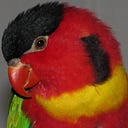Brazzaville Beach by William Boyd — Review
An evocative and provocative look at the intertwining between professional and personal life for a research scientist
by GrrlScientist for scienceblogs.com | @GrrlScientist
I absolutely loved this book, Brazzaville Beach by William Boyd (New York: Perennial, 1990; Amazon US /Amazon UK). Even though the book was published 16 years ago, I cannot understand how I could have missed it. Not only is the prose surprisingly rich and evocative, but this book is probably one of the best examples of a new genre, LabLit — short for Laboratory Literature — which explores real-life scientific themes without being science fiction.
This interesting story is told in three parts, two are told in the first person by British scientist Hope Clearwater, and the third about her, told in the third person. The first part details her courtship and increasingly troubled marriage to her husband, the brilliant but emotionally fragile mathematician, John; the second part follows her adventures as a primate researcher in a civil war-torn region of Africa, and the third part follows her recovery from her personal and professional traumas, spent on Brazzaville Beach, somewhere in Africa.
The book opens with a scene from Brazzaville Beach, which is probably near the Congo river, where Clearwater is staying while she recovers from her shattered personal and professional life. A behavioral ecologist, Clearwater left her home in England and went to Africa to participate in primate research while healing from the psychic wounds inflicted by her marriage to a brilliant but mentally ill mathematician, John. There are flashbacks throughout the book to her previous life in England with John, and into his ever-increasing despair, as well as to her new relationship while in Africa with an Egyptian MIG flier who dreamed of being an astronaut, but instead flies bombing runs for one side of the civil war.
To escape her marriage, Clearwater accepts a position in Africa observing and being accepted by a group of chimpanzees. Once in Africa, Clearwater immerses herself into her research in the hope that doing so will allow her the time, and the emotional and intellectual distance necessary to sort out her shattered personal life. However, this desire was abruptly destroyed when she noticed a startling behavior in her chimpanzee troup — behavior that conflicted with everything that her boss and mentor, Dr. Mallabar, believed. Because she dutifully reported this behavior to Dr. Mallabar, Clearwater soon finds herself plunged into a dramatic and suspenseful crisis that threatens not only her scientific integrity but also her life after everyone in the camp turns against her.
The book compares the two primate societies that Clearwater inhabits, human and chimp, and it reveals that the chimp society is more human-like than anyone previously suspected or wished to believe. Additionally, this book is filled with scientific and mathematical metaphors that I found to be quite fascinating in their ability to accurately convey emotions. This book is an intellectual thriller and, on another level, it is an exciting adventure story, while also being a subtle examination of the nature of personal relationships.
This book is not a new release, but it is new to me. It is a compelling and fascinating read that I highly recommend.
Enjoy my writing? Please click on the green heart on the left side to recommend this piece. Follow me on Medium for more like this.
.. .. .. .. .. .. .. .. .. .. .. .. .. .. .. .. .. .. .. .. .. .. .. .. .. .. .. .. .. .. .. .. .. .. .. .. .. .. .. .. .. .. ..
GrrlScientist is very active on twitter @GrrlScientist and you can follow all her writing by subscribing to her TinyLetter
Originally published at scienceblogs.com on 12 January 2007.
